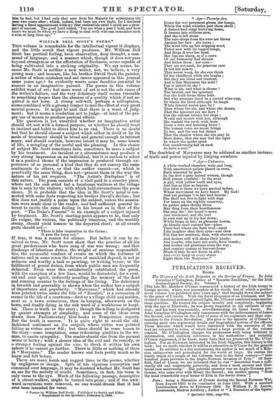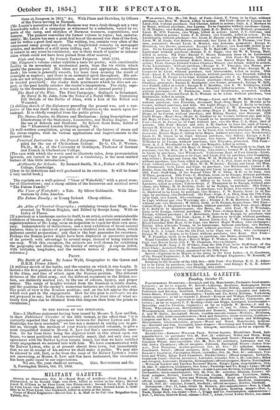PUBLICATIONS RECEIVED.
Booss.
The History of the Irish Brigades in the Service of France. By John Cornelius O'Callaghan, Editor of " Macaria3 Excidium," for the Irish Archmological Society, &c. Volume I. [The late Mr. Matthew O'Conor commenced a history of the Irish troops in foreign service, which was incomplete at his death, but of which a posthu- mous volume was published nine years ago * that brought down the subject to the peace of Utrecht. With the florid eloquence of an Irishman, and the civilian's theatrical notions of actual fight, Mr. O'Conor combined some merito- rious qualities. He treated his subject broadly and completely, beginning with the age of Elizabeth; he was pretty impartial in his estimate of con- duct; and his book was readable, notwithstanding its tinsel finery. Mr. John Cornelius O'Callaghan only commences with the dethronement of Tames the Second, and carries on the story of some of his regiments and their com- manders to the French Revolution. His plan is the opposite of O'Conor's; entering more into regimental details and biographical notices of the officers. Those minutim which would have interfered with the narrative of the text are relegated to notes, of which indeed a large portion of the volume consists. Mr. O'Callaghan charges his predecessor with being deficient in information, and omitting references to his authorities : and certainly O'Conor suppressed, if he knew, many facts that are preserved by Mr. O'Cal- laghan. For an Irishman interested in the Irish Brjgades, this history is the book ; but we doubt whether it will be so attractive as O'Conor for the general reader. In addition to a dry minuteness, the author is too much of a Mile- sian antiquarian and genealogist for the world at large. He carries the family origin of a couple of his Colonels back to the third century—" nine hundred years previous to the Anglo-Norman invasion of Erin." Of Bars- field, Earl of Lucan, we are informed that he was "descended from a suffi- ciently old and respectable paternity, and from a most ancient and illus- trious race maternally." The paternal ancestor was an Anglo-Norman gen- tleman, who came over with Henry the Second ; his mother sprang "from the most remarkable royal house of Erin in the heroic times."] .Pegu ; being a Narrative of Events during the Second Burmese War, from August 185'2 to its conclusion in June 1853. With a succinct Continuation down to February 185t: By William F. B. Laurie, Lieutenant, Madras Artillery ; Author of "A Narrative of the Opera- 'Spectator 1845, page 614,
tions at Rangoon in 1852," &c. With Plans and Sketches, by Officers of the Force serving in Burmah.
[Mr. Laurie's narrative of the first Burmese war was a fresh though not a very remarkable reflex of a campaign as witnessed by a subaltern, varied by re- ports of the camp, and sketches of Burmese manners, superstitions, and scenery. The present resembles the former volume in topics; but, unfortu- nately, Mr. Laurie has seen a good deal less of the second war than of the first, and he writes a good deal more. The writing, too, consists very often of the commonest camp gossip and reports, or longwinded remarks on newspaper articles, and matters of a still more trifling cast. A "narrative" of the war it cannot in any sense be considered; nor is there much of matter or inform- ation which could not have been gained from other sources.] Idyls and Songs. By Francis Turner Palgrave. 1818-1851. [Mr. Palgrave's volume rather exhibits a taste for poetry, with considerable facility in its secondary or mechanical parts, than the vie vivida which marks the genuine poet. His ideas are pretty and appropriate, sometimes fresh ; his verse is generally smooth, his lame lines seeming the result of oversight or neglect ; and there is an animated spirit throughout. His sub- jects are not always judiciously chosen, and the best are generally overdone or treated peculiarly : the reader finds sentiments which he does not ex- pect, or the poet hardly satisfies the reader's imagination. The style, espe- cially in the dramatic pieces, is too much an echo of Annual poetry.] The Book of the War. The First Campaign : Gallipoli to Sebastopol. By Percy B. St. John, from the Notes of a Naval Officer. Containing full Details of the Battle of Alma, with a List of the Killed and Wounded.
[A shilling sketch of the diplomacy preceding the present war, and a nar- rative of the war itself from the battle of Oltenitza to the march upon Se- bastopol. It is chiefly compiled from the public prints.]
The Steam-Engine, its History and Mechanism : being Descriptions and Illustrations of the Stationary, Locomotive, and Marine Engine. For the use of Schools and Students. By Robert Scott Burn, Editor of the "Illustrated London Drawing-Book," &c. [A well-written compilation, giving an account of the history of steam and Dm steam-engine, with its various applications and improvements to the present time.] Practical Instruction in the French _Language. First Course. Com- piled for the use of Cheltenham College. By G. Ch. F. Werner, Ph.D., M.A., of the University of Gottingen, Professor of German and French in Cheltenham College.
[The care with which the words used to illustrate rules, from pronunciation upwards, are turned to the purposes of a vocabulary, is the most marked feature of this little introduction.]
Arithmetic for Schools. By Barnard Smith, M.A., Fellow of St. Peter's College, Cambridge.
[Clear in its definitions and well graduated in its exercises. It will be found a very useful book.] The reprints are a well-printed "Vicar of Wakefield," with a great num- ber of illustrations; and a cheap edition of the humorous and satirical novel "The Falcon Family."
The Vicar of Wakefield; a Tale. By Oliver Goldsmith. With Illus- trations by John Absolon.
The Falcon Family; or Young Ireland. Cheap edition.
Mars.
An Atlas of Classical Geography ; containing twenty-four Maps. Con- structed by William Hughes, and Edited by George Long. With an Index of Places.
[If a portrait or a landscape carries in itself, to an artist, certain unmistakeable evidences of likeness, the maps of this atlas, revised and rerevised under the superintendence of Mr. Long, seem on inspection to vouch for their own accu- racy. Independently of distinctness, and a neat exhibition of broad natural features, there is a species of proportion—a truthful look about them, which indicates careful preparation; and that is the best guarantee for exactness. Perhaps the Roman power might have been displayed at successive periods of its growth with advantage by several maps, instead of being limited to one map. With this exception, the subjects are well chosen for exhibiting the geography and illustrating the history of antiquity. A copious index, with latitudes, longitudes, and the modern names of places, facilitates reference.] Parer.
The Battle of Alma. By James Wyld, Geographer to the Queen and H.R.H. Prince Albert.
[A military sketch of the battle, and the country on which it was fought. It includes the first position of the Allies on the Bulganak ; their line of march to the Alma, and line of attack upon the Russian position. The different divisions of the Allied army, and the different regiments in the British sec- tion, are distinctly marked out, by the use of colours, figures, and proper names. The range of heights wrested from the Russians is boldly drawn, and the positions of the enemy's numerous batteries are clearly pointed out. The point of view is the Russian position • and on the left appear the ships which took part in the engagement. How far this plan is authentic we are not prepared to say; but it looks accurate ; and a far truer idea of what ac- tually took place can be obtained from this diagram than from the prints in circulation.]
TO THE EDITOR OP THE SPECTATOR.
Sin—A libellous statement having been issued by Messrs. S. Low and Son, in their .Publishere Circular of the 16th instant, to the effect that "it is currently reported that the agreement between Sir Bulwer Lytton and Mr. Routledge has been rescinded," we lose not a moment in asking you to per- mit us, through the medium of your widely-circulated columns, to give a most unqualified denial to Messrs. S. Low and Son's unwarrantable asser- tion. So far from there being the slightest truth in this attack upon our house, we most positively and unequivocally assert, that not only does our agreement with Sir Bulwer Lytton remain intact, but that we have fulfilled every engagement we entered into with him. We have communicated with Sir Bulwer Lytton, who is at present absent from town, but immediately that we are in receipt of his answer we shall make it public. We may also be allowed to add, that, so far from the issue of Sir Bulwer Lytton's works not answering, as Messrs. S. Low and Son have insinuated, the circulation has been quite equal to our expectations. We are, Sir, your obedient servants, GEO. Itormeuan and Co. 2, Farringdon Street, Oct. 19, 1854.



























 Previous page
Previous page